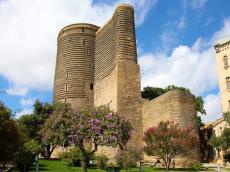Today.Az » Arts & Entertainment » Land Of Fire offers captivating cultural landmarks
13 February 2023 [10:23] - Today.Az

Laman Ismayilova With its vibrant cultural heritage, the Land Of Fire offers captivating cultural monuments, Azernews reports. Numerous monuments dotted around the country remain a symbol of Azerbaijan's rich history. The Maiden Tower, Ateshgah temple, petroglyphs in Gobustan, and other sites excite the imagination of history and culture buffs. The Azerbaijani State Service for Protection, Development and Restoration of Cultural Heritage is actively involved in the protection of the country's monuments. The service has recently disclosed the number of historical and cultural monuments in Azerbaijan. Over this time, the State Service for Protection, Development and Restoration of Cultural Heritage has registered 6,308 monuments in the country. The list includes historical and cultural sites of world importance (82 sites), national importance (2,059), and local importance (4,167). Let's take a look at some of Azerbaijan's most significant landmarks. The Maiden Tower One place you shouldn't miss while strolling Baku is the Maiden Tower, rising in the southeastern part of the Icharishaher fortress. Some suggest that it was constructed between the IV-VI centuries AD, others speculated it was built sometime between the XI-XII centuries. The tower has a secret underground passage, which is thought to have run from the tower to the Shirvanshahs' Palace, which was the last residence of the rulers of the Shirvan State, the most powerful state in Azerbaijan's history. In 2000, the Walled City of Baku with Shirvanshah's Palace, and Maiden Tower were inscribed in UNESCO World Heritage List. Ateshgah Temple Famous for its "eternal flame", Yanar Dag attracts dozens of tourists every year, Yanar Dag is a natural gas fire that blazes continuously on a hillside on the Absheron Peninsula on the Caspian Sea near Baku. Unlike mud volcanoes, the Yanar Dag flame burns fairly steadily, as it involves a steady seep of gas from the subsurface. The flames emanate from vents in sandstone formations and rise to a height of 10 meters. The Yanardag State Historical, Cultural and Natural Reserve was re-opened in 2021 after the overhaul. The reserve includes a museum, a 500-seat amphitheater for outdoor concerts, workshops, shops, and a parking lot. Gobustan Petroglyphs Gobustan rock carvings were discovered in 1939 at the foot of the mountain Jingirdag and on the top of Yazili Tepe. The rock engravings depict primitive men, animals, battle pieces, ritual dances, bullfights, boats with armed oarsmen, warriors with lances in their hands, camel caravans, and pictures of the sun and stars. These unique petroglyphs were recognized as UNESCO World Heritage Sites in 2007. Regular research and archaeological work are carried out in the reserve with the participation of local and foreign experts. In 2016, digital data about Gobustan started operating in order to re-document Gobustan rock carvings using modern methods. Within its framework, 3D modeling was used for the first time in the study of Gobustan's rock art. New petroglyphs were discovered in Gobustan last year. The three-year research on the territory of Jingirdag-Yazili Tapa led to the discovery of 1,347 petroglyphs and symbols ( before 877), engraved on 169 stones (before 151). The new discoveries were documented and registered.
|